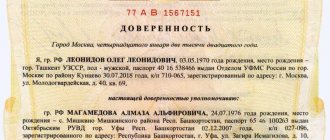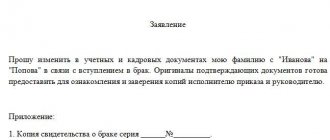Application for recusal of a judge
The challenge must be submitted in writing (in a written application addressed to the court or addressed to the judge). In your application for challenge, be sure to indicate the reasons for your lack of confidence in the judge, citing the violations that, in your opinion, he committed during the preparation of the case for consideration or during the trial.
In this case, it is necessary to provide specific facts of these violations.
As a general rule, a judge must be challenged before considering the case on the merits. However, if the basis for disqualifying a judge appears and becomes known to you after the start of the consideration of the case on the merits, you can file for the recusal of the judge during the consideration of the case.
Expert opinion
Novikov Igor Timofeevich
Legal consultant with 6 years of experience. Specializes in the field of civil law. Law teacher.
In the next article we will try to understand the concept and meaning of procedural deadlines in civil and criminal proceedings. And to always stay up to date with site news, subscribe to new articles.
To learn about other possibilities for appealing against the actions and inactions of a judge in criminal or civil proceedings, I advise you to read the book “Do You Trust the Court?”
If participants in a trial suspect that a judge is biased in the case before him, then they have the power to demand his removal from the process. To do this, you must file an application to challenge the judge. It is worth noting that the judge himself can also initiate removal. This action is considered a recusal.
Legislative acts established certain conditions for the procedure for disqualifying a judge:
- The challenge must be justified and motivated.
- A challenge may occur before the consideration of the proceedings on the merits begins.
- The same person does not have the right to file an application to challenge a judge on the same grounds a second time.
Note to citizens: how to challenge a judge.
Recent trends in legislative activity directly indicate the desire of the legislator to facilitate the work of the judicial system, and often, to the detriment of the rights and legitimate interests of the parties to the trial.
In this publication, summarizing my own experience, I propose a certain structure of the legal justification for an application to disqualify a judge in cases where doubts arise about his objectivity and impartiality when considering a case.
This construction is applicable both in civil proceedings and in criminal proceedings, since the grounds for disqualifying a judge in these processes are similar (Article 16 of the Code of Civil Procedure of the Russian Federation, Article 61 of the Code of Criminal Procedure of the Russian Federation). I will consider the issue of recusal using the example of civil proceedings.
The relevance of this topic is also due to the fact that in light of recent changes in civil procedural legislation, you have the only chance to challenge a judge on the same grounds (Part 4 of Article 19 of the Code of Civil Procedure of the Russian Federation). In case of refusal to satisfy the challenge, in the absence of other grounds, this right is lost. Therefore, the preparation of an application for recusal must be taken seriously.
Criminal procedural legislation does not yet contain such restrictions. Similar changes in this part come into force on August 13, 2019.
So.
In accordance with Part 1 of Art. 16 of the Code of Civil Procedure of the Russian Federation, the grounds for disqualifying a judge are circumstances when:
1) during the previous consideration of this case, participated in it as a prosecutor, court secretary, representative, witness, expert, specialist, translator;
2) is a relative or relative of one of the persons participating in the case, or their representatives;
3) is personally, directly or indirectly interested in the outcome of the case, or there are other circumstances that cast doubt on his objectivity and impartiality.
4) the composition of the court considering the case cannot include persons who are related to each other.
From October 25, 2019 Clause 1 Part 1 Art. 16 of the Code of Civil Procedure of the Russian Federation is supplemented by one more subclause 1.1: if the judge was a judicial conciliator in this case.
If the grounds for challenge specified in clauses 1, 2 and 4 are still more or less clear, then clause 3 often causes difficulties in application. It should be noted that the grounds specified in paragraph 3 are the most often used when challenging judges. These may include such circumstances as: the judge expressing his evaluative opinion on the case before the court decision, the receipt by the judge or his relatives/acquaintances of material or legal benefits in a certain outcome of the case, the judge was previously in official or other dependence on someone of the participants in the case, an obvious gross violation of the rights of the participants in the process, obstruction of the realization of their rights and legitimate interests, etc.
According to Part 1 of Art. 46 of the Constitution of the Russian Federation, everyone is guaranteed judicial protection of their rights and freedoms.
Judges are independent and subject only to the Constitution of the Russian Federation and federal law (Part 1, Article 120 of the Constitution of the Russian Federation).
In accordance with Art. 2 of the Code of Civil Procedure of the Russian Federation, the tasks of civil proceedings are the correct and timely consideration and resolution of civil cases in order to protect the violated or disputed rights, freedoms and legitimate interests of citizens , organizations, rights and interests of the Russian Federation, constituent entities of the Russian Federation, municipalities, and other persons who are subjects of civil , labor or other legal relations. Civil proceedings should help strengthen law and order, prevent crime, and foster respect for the law and the court.
According to Part 2 of Art. 7 of the Code of Civil Procedure of the Russian Federation, if this Code grants a judge the right to single-handedly consider civil cases and perform certain procedural actions, the judge acts on behalf of the court.
Clause 2 of Article 11 of the Code of Judicial Ethics establishes that a judge must fulfill his duties conscientiously, at a high professional level, and take all measures for a timely and qualified consideration of the case.
A judge must exercise judicial powers based solely on an assessment of the factual and legal circumstances of the case, in accordance with his inner conviction, respecting the procedural rights of all persons involved in the case, regardless of any outside influence, pressure, threats or other direct or indirect interference in the process consideration of the case, no matter from which side it turns out and no matter what motives and goals it is caused by (Article 8 of the Code of Judicial Ethics).
From the interrelated provisions of Part 1 of Art. 46 and part 1 of Art. 120 of the Constitution of the Russian Federation implies the purpose of judicial control as a way of resolving legal disputes on the basis of the independence and impartiality of the court. Consideration of a dispute by an independent and impartial court is also an integral element of the right to a fair trial within the meaning of paragraph 1 of Art. 6 of the Convention for the Protection of Human Rights and Fundamental Freedoms.
In accordance with paragraph 1 of Art. 6 of the Convention for the Protection of Human Rights and Fundamental Freedoms, everyone, in the event of a dispute as to his civil rights and obligations or of any criminal charge brought against him, has the right to a fair and public hearing within a reasonable time by an independent and impartial tribunal established by law.
The Russian Federation, as a party to the Convention for the Protection of Human Rights and Fundamental Freedoms, recognizes the compulsory jurisdiction of the European Court of Human Rights on issues of interpretation and application of the Convention and its protocols in the event of an alleged violation by the Russian Federation of the provisions of these treaty acts, when the alleged violation took place after their entry into force in relation to the Russian Federation (Article 1 of the Federal Law of March 30, 1998 No. 54-FZ “On the ratification of the Convention for the Protection of Human Rights and Fundamental Freedoms and the Protocols thereto”), therefore, the application by the courts of the said convention should be carried out taking into account the practice of the European Court of Human Rights in order to avoid any violation of the Convention for the Protection of Human Rights and Fundamental Freedoms (clause 10 of the resolution of the Plenum of the Supreme Court of the Russian Federation dated October 10, 2003 No. 5 “On the application by courts of general jurisdiction of generally recognized principles and norms of international law and international treaties of the Russian Federation").
In a number of decisions of the European Court of Human Rights, including the decisions of February 26, 1993, Padovani v. Italy (paragraphs 25 and 27), of February 28, 1993, Fey v. Austria ( paragraphs 28 and 30) and of 10 June 1996 “Pullar v. the United Kingdom” (paragraph 30), based on the interpretation of Article 6 of the Convention for the Protection of Human Rights and Fundamental Freedoms, the general criteria for an impartial court are formulated:
- firstly, the court must be “subjectively impartial” , i.e. none of its members may openly display partiality or personal prejudice; personal impartiality is assumed until proven otherwise. This criterion reflects the personal beliefs of the judge in a particular case;
- secondly, the court must be “objectively impartial” , i.e. sufficient guarantees are necessary to exclude any doubts in this regard. This criterion, in accordance with which the question is decided whether certain verifiable facts, regardless of the behavior of the judge, allow one to doubt his impartiality, takes into account external signs: when making an appropriate decision, the opinion of interested parties is taken into account, but does not play a decisive role - decisive is whether their concerns can be considered objectively justified. Any judge about whose impartiality there are legitimate grounds for doubt must withdraw from the court hearing the case.
As the Constitutional Court of the Russian Federation has repeatedly emphasized, the Russian Federation as a rule of law state is obliged to provide an effective system for guaranteeing the protection of human and civil rights and freedoms through justice that meets the requirements of fairness (resolutions of the Constitutional Court of the Russian Federation dated March 16, 1998 No. 9-P, dated February 10, 2006 city No. 1-P, etc.).
The Constitution of the Russian Federation guarantees everyone judicial protection of their rights on the basis of competition and equality of the parties (Part 3 of Article 123 of the Constitution of the Russian Federation).
Compliance with these principles of administration of justice is ensured by the entire range of civil procedural means and procedures.
So, part 1 of Art. 12 of the Code of Civil Procedure of the Russian Federation establishes that justice in civil cases is carried out on the basis of adversarial law and equality of the parties.
It is the court, by virtue of Part 2 of Art. 12 of the Code of Civil Procedure of the Russian Federation, while maintaining independence, objectivity and impartiality, manages the process and creates conditions for establishing factual circumstances when considering and resolving civil cases, which is necessary to achieve the objectives of civil proceedings. This power of the court, being a consequence of the principle of judicial management of the process, acts as a procedural guarantee of the right of citizens to judicial protection enshrined in Article 46 (Part 1) of the Constitution of the Russian Federation (determination of the Constitutional Court of the Russian Federation dated April 26, 2016 No. 859-O).
The impartiality of the court when considering a specific case is ensured by the civil procedural institution of recusal of a judge.
As stated above, the circumstances in which the participation of a judge in the consideration of a case within his jurisdiction is unacceptable due to the impossibility of observing the principle of impartiality of the court are provided for in Article 16 of the Code of Civil Procedure of the Russian Federation.
Thus, a judge cannot consider a case and is subject to recusal if he is personally, directly or indirectly interested in the outcome of the case or there are other circumstances that cast doubt on his objectivity and impartiality (Clause 3, Part 1, Article 16 of the Code of Civil Procedure of the Russian Federation).
In the case of a challenge, the court hears the opinions of the persons participating in the case, as well as the person to whom the challenge is filed, if the challenger wishes to give explanations. The issue of challenge is resolved by a court ruling (Article 20 of the Code of Civil Procedure of the Russian Federation).
Accordingly, the impartiality of judges hearing a civil case is presumed until proven otherwise. A guarantee of compliance with the principle of impartiality of a judge considering a case alone when resolving the issue of a challenge filed against him is the issuance of a reasoned ruling confirming the absence of circumstances that would allow one to doubt his impartiality when considering this case.
In addition, procedures for reviewing court decisions by higher courts are a guarantee. At the same time, the question of the objectivity and impartiality of the court must be resolved in each specific case, taking into account the factual circumstances, the establishment of which is within the competence of courts of general jurisdiction. (rulings of the Constitutional Court of the Russian Federation dated February 8, 2007 N 325-О-О, dated March 20, 2008 N 155-О-О, dated July 15, 2008 N 465-О-О, dated May 28, 2009 . N 617-О-О, etc.).
If circumstances are established that cast doubt on the impartiality of the judges (judges) of a lower instance, and the judicial acts issued by them are annulled by a court of a higher instance, the case must be sent for a new trial by a different composition of judges.
From the above norms of the Constitution of the Russian Federation in their relationship with the provisions of the Convention for the Protection of Human Rights and Fundamental Freedoms, which has priority over domestic laws, from the interpretation of these provisions of the Convention in the relevant decisions of the European Court of Human Rights, as well as from the procedural norms of Articles 12, 16, 21 of the Code of Civil Procedure of the Russian Federation it follows that the right to judicial protection is a fundamental constitutional and procedural right-guarantee. One of the inalienable properties of the right to judicial protection and a necessary condition for a fair trial is the right to an impartial trial, ensured by the possibility of challenging judges provided for by law. In a democratic society, litigants must have confidence in the court, which can only be called into question on the basis of credible and reasonable evidence to the contrary.
When allowing an application for recusal, the court must determine whether the applicant's doubts that a particular judge was not sufficiently impartial were objectively justified.
At the same time, Chapter 2 of the Code of Civil Procedure of the Russian Federation, which contains the grounds for disqualifying a judge, is common to all stages of civil proceedings; therefore, any judge who falls under these grounds is subject to challenge at any stage of the process.
Otherwise, the implementation of the provisions of the Code of Civil Procedure of the Russian Federation on challenge will be incomplete, which will entail a violation of the applicant’s rights to a fair trial, a mandatory component of which is the impartiality of the court.
In addition, doubts about the objectivity and impartiality of a judge can be associated with abuses on his part, which can be expressed in infringement of the rights and legitimate interests of a party, which, among other things, may indicate the presence of a corruption component in the actions of the judge.
In accordance with the definition in the federal law of December 25, 2008. No. 273-FZ “On Combating Corruption”: corruption is not only the giving or receiving of a bribe, but also abuse of official position , abuse of power , commercial bribery or other illegal use by an individual of his official position contrary to the legitimate interests of society and the state in order to obtain benefits in the form of money, valuables, other property or services of a property nature, other property rights for oneself or for third parties, or the illegal provision of such benefits to the specified person by other individuals.
This law repeatedly points out the need for interaction between the state and citizens in combating corruption. Thus, Article 7 establishes the main directions of activity of government bodies to increase the effectiveness of combating corruption, namely:
- creating a mechanism for interaction between law enforcement and other government bodies with public and parliamentary commissions on anti-corruption issues, as well as with citizens and civil society institutions;
- adoption of legislative, administrative and other measures aimed at attracting state and municipal employees, as well as citizens, to take a more active role in combating corruption, and at creating a negative attitude towards corrupt behavior in society;
- strengthening control over the resolution of issues contained in appeals from citizens and legal entities.
One of the main principles of combating corruption in the Russian Federation in accordance with paragraph 7 of Article 3 of this law is cooperation between the state and individuals.
At the same time, by combating corruption, the law understands the activities of federal government bodies, government bodies of constituent entities of the Russian Federation, local government bodies, civil society institutions, organizations and individuals within the limits of their powers (Article 1 of the Anti-Corruption Law):
a) to prevent corruption, including identifying and subsequently eliminating the causes of corruption (prevention of corruption);
b) to identify, prevent, suppress, disclose and investigate corruption offenses (fight against corruption);
c) to minimize and (or) eliminate the consequences of corruption offenses.
Thus, the grounds for disqualifying a judge may be closely related to the corruption component, which, in turn, should entail bringing the perpetrators to criminal liability.
In the vast majority of applications for challenge, the courts do not satisfy, do not bother to indicate the reasons for the refusal and carefully consider the applicant’s arguments, but this should not bother you, since if there is sufficient data on the legality of the requested challenge, a violation of the right to a fair trial is grounds for filing a complaint to the European Court of Human Rights (ECHR), since, contrary to the opinion of the Constitutional Court of the Russian Federation, the Russian Federation is not a legal state.
image source delo-sochi.ru
Recusal of a judge in civil proceedings. Legal practice. Sample
You must apply for removal in the following cases:
- If the arbitrator withholds important documentation.
- Doesn't want to ask for specific documents.
- Doesn't question an important witness.
- If the secretary enters fictitious information into the court record.
- The assistant judge deals with forgery in the case materials.
- Other good reasons.
When to file an application to challenge a judge?
This can be done the moment the hearing begins. Then it is not possible to do this.
How to challenge an expert?
If the court decision does not contain information about the expert, this means that the court employee did not check the availability of specialists in the expert staff. And also did not test their knowledge. In this case, it is possible to file a private complaint.
Application for recusal of a judge in civil proceedings. Seven reasons for this
- Incorrect and untimely study of court cases.
- Justice is not carried out in compliance with the norms of the Civil Procedure Code of the Russian Federation.
- Lack of impartiality.
- The Themis minister does not explain to the participants their rights and responsibilities.
- Does not provide assistance in realizing their rights.
- Does not warn them of possible consequences.
- Does not create conditions for a detailed study of case materials and evidence.
Why do the appellate and cassation courts take requests to disqualify a judge seriously?
If the removal of a court employee is prohibited, this significantly affects the legality and validity of the court decision.
Who reviews the application?
A petition to challenge a court employee is considered by a higher judicial institution: the appellate or cassation court.
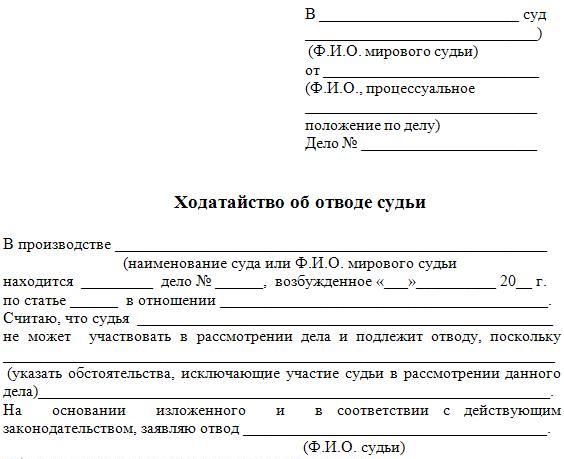
How can one declare the removal of a judicial employee?
The removal of a judicial employee is a kind of protection of the interests of all participants in the process. This happens if the judge was noticed to be biased towards a particular case. All this is a serious violation that is contrary to the law.
Reasons for applying
Civil, administrative, criminal and arbitration proceedings contain similar provisions on the reasons for the removal of a judicial employee. Let's look at the differences.
Recusal of the judge. Examples of statements, reasons and replacement regulations
Removal of a court employee:
- In civil proceedings: a judge cannot participate in the proceedings if he has previously been a prosecutor, secretary, witness, expert, specialist or translator in this dispute, a judge in other instances, or is a relative of one of the parties to the dispute.
- In the arbitration process: a court employee cannot take part in a dispute a second time if he considered the case as an arbitrator, was a secretary, representative, expert, etc. And also if he is a relative of one of the parties to the proceedings.
- In criminal proceedings: a judicial officer cannot study a criminal case if he is or was an injured party in it. Or he is considered a plaintiff, witness, expert, investigator, prosecutor. It is not allowed to involve him in a re-examination of the case.
- In the administrative process: all of the above provisions can be included here.
How to declare a suspension?
According to the general rules, the statement can be announced at the stage of forming the composition of the court session.
Causes and Effects
Before we talk about why you can file such a petition, let’s look at the subject of the article.
Recusal of a judge is a legally prescribed procedure used in situations where there is information about the existence of an interest on the part of the judge in the outcome of the consideration of the case, as well as other reasons that cast doubt on its objectivity
The reasons for disqualifying a judge are set out in Art. 16 Code of Civil Procedure of the Russian Federation .
However, many participants in court hearings, being confident that the process is not adversarial in nature, ignore the mistakes made by the court in the consideration of the case. The reason is hidden in the hope of an appeal.
But a challenge must be filed in a timely manner, since it is in such a statement that procedural violations are recorded. And in the appellate instance, it will not be possible to refer to previously committed flaws in the legal proceedings unless you make an appropriate appeal.
Procedural violations are grounds for canceling a court decision, but they must be recorded in a timely manner. Otherwise, the appellate court will not be able to consider these facts.
Definition and legislative regulation
Recusal of a judge is a way to ensure an objective consideration of a dispute. Its essence is the exclusion from the process of a judge who has previously formed his opinion or is in some way interested in the outcome of the case.
Expert opinion
Kostenko Tamara Pavlovna
Lawyer with 10 years of experience. Author of numerous articles, teacher of Law
To understand what a challenge in court is, you should study Articles 16 – 21 of the Code of Civil Procedure of the Russian Federation. There are rules governing the procedure for filing petitions, their consideration, as well as the grounds for replacing a judge in the process.
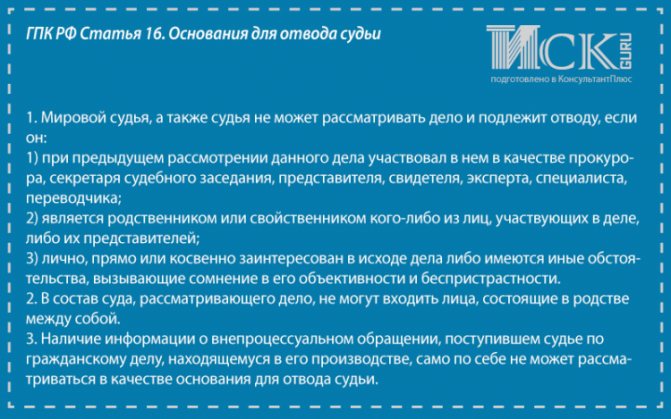
Grounds for application
Let us examine in more detail situations where each party to the process has the right to insist on changing the composition of the court:
- the judge is a relative of another participant on the court;
- the judge has already taken part in the proceedings in the early stages, acting in a different procedural role;
- is related to representatives of the parties;
- there is evidence to indicate that the judge may not be unbiased when making a decision.
At the same time, there may be various reasons that interfere with impartiality. Practicing lawyers recommend filing a request for recusal if there are examples of “gender discrimination”, incorrect reflection of the proceedings of the meeting in the minutes, refusal to include documents and testimony.
It is important to understand that an unfounded application will be rejected, so a challenge can only be filed if the applicant has evidence.
Kinship as a basis for disqualifying a judge
The degree of relationship sufficient to be considered a basis for disqualification has not been established by the Arbitration Procedure Code of the Russian Federation; current legislation also does not define the word “relative”. Consequently, any degree of relationship (cousins, sisters, etc.), including non-blood (parents and relatives of the spouse, stepfather, stepmother, etc.) can serve as the basis for recusal. Russian judicial practice is already familiar with challenges of judges when the cousin of the judge’s wife had an independent interest in the case.
This is interesting: What documents are needed for a divorce through court?
How to file a challenge
An application to disqualify a judge must be submitted in a timely manner. Any process begins with the composition of the court being announced, after which the participants in the process are given the opportunity to disagree with it and substantiate their claims.
Expert opinion
Novikov Igor Timofeevich
Legal consultant with 6 years of experience. Specializes in the field of civil law. Law teacher.
It is important that a judge can also recuse himself if he is aware of the presence of factors that may affect his impartiality. If there is no self-recusal, each of the parties to the process has the right to submit an application.
The petition should be submitted immediately, since such an opportunity will not arise during the meeting itself. An exception is situations in which information about the judge’s interest is received from another participant in the process already during the hearing.
The application for recusal is considered by the judge himself.
In the event that we are talking about the challenge of the full panel of judges (or several of them) involved in the consideration of the case, the decision is made by the entire panel based on voting.
If the requirement specified in the application is satisfied, the meeting is postponed to a new date. Situations may arise in which it will not be possible to form a new judicial panel. In this case, the consideration of the case will be continued in a new court, the decision on the choice of which is made by a higher authority.
What cannot be grounds for disqualifying a judge
The list of circumstances that are grounds for challenge is spelled out quite clearly, so it is easy to identify circumstances that are not grounds for challenge of a judge or arbitration assessor:
- The case has already been considered in court, but after appealing the decision, the cassation court sent it for a new trial.
When sending the case for a new trial, the cassation court may, in accordance with paragraph 3 of Part 1 of Art. 287 of the Arbitration Procedure Code of the Russian Federation indicate that the procedure for considering a case must be carried out by a collegial composition of judges and (or) in another judicial composition. However, if there is no such indication, the case may be sent to the same judge who considered it in the first instance - the current legislation does not establish any prohibitions.
- There is information that the arbitration court received an extra-procedural appeal in a case that is being processed by a judge of the arbitration court.
Arbitration Procedure Code of the Russian Federation in Part 1.1 of Art. 21 directly establishes that the very fact of the existence of such an appeal (and, therefore, such information) cannot be a basis for challenge. Nevertheless, the circumstances voiced during an extra-procedural appeal in the case may fall under the previously mentioned circumstances, which may raise doubts about the impartiality of the judge (Clause 5, Part 1, Article 22 of the Arbitration Procedure Code of the Russian Federation).
How to properly prepare a document
There is no legally established format for an application for recusal. However, over time, a generally accepted structure for such documents has developed that can be used without fear of rejection due to the absence of important elements.
As a rule, a petition to disqualify a judge in a civil case in a court of general jurisdiction consists of the following parts:
- A cap
- indication of the court (with address);
- information about the applicant (full name, address);
- details of the case (number, details of the plaintiff and defendant).
- Title (the title of the document must indicate the type “ APPLICATION ” and not “ PETITION ”).
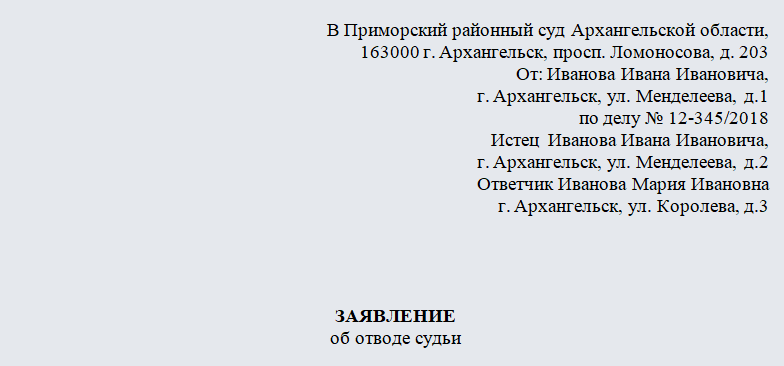
- The content of the information about the case;
- an indication of the reasons why the court in its current composition cannot consider the case;
- justification for the legality of the request.
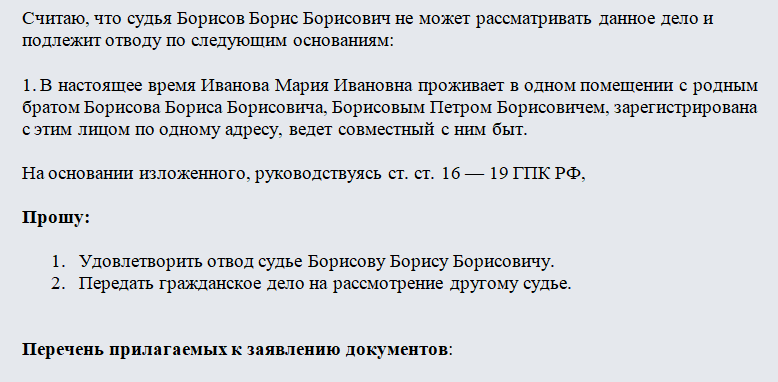
It is important that you should not indicate as reasons any facts that are not confirmed - the request will be rejected, the trial will be continued with the same composition, and these arguments will not play a role in the appellate instance.
It should be understood that in practice, most applications for recusal are rejected because the arguments put forward by the applicant are considered irrelevant. In addition, with the help of a petition it will not be possible to delay the case - the decision to reject the request is made during the consideration of the case.
However, all points indicated by the applicant can be taken into account in the appellate instance. And a decision made contrary to reasoned arguments in the application may be canceled ( Art.
330 Code of Civil Procedure of the Russian Federation).
The Civil Procedure Code of the Russian Federation provides for the possibility of challenging a judge. The measure is aimed at ensuring judicial impartiality and independence. Any participant in the process has the right to file an application if there are grounds. The challenge of a judge in civil proceedings is carried out in accordance with the procedure established by law.
List of grounds for disqualifying a judge
The grounds for disqualifying a judge are conventionally divided into two categories. The first includes cases where the case has already been considered in court, and the judge in the previous consideration of this particular case acted as:
- judges (clause 1, part 1, article 21 of the Arbitration Procedure Code of the Russian Federation),
- an assistant judge or court secretary, as well as a prosecutor, expert, specialist, witness or representative (clause 2, part 1, article 21),
- judges of a foreign court, arbitration court or arbitration (clause 3, part 1, article 21).
This is interesting: Application to bailiffs to cancel enforcement proceedings
This group of grounds for challenge is easily determined, so grounds from this group usually lead to the judge’s self-recusal. The second group of grounds is related to various types of interest (personal, related, official, etc.), which includes cases when the judge:
- relative of the person participating in the case (or his representative) (clause 4, part 1),
- is personally, directly or indirectly interested in the outcome of the case or there are other circumstances that may raise doubts about his impartiality (clause 5, part 1),
- is (previously was) in official or other dependence on the person participating in the case (or his representative) (clause 6, part 1);
- made public statements or gave an assessment on the merits of the case under consideration (clause 7, part 1). Such statements and assessments are actually a judge’s pre-determination of his position on the case, which is unacceptable, since the case has not yet been considered in the manner prescribed by law.
The grounds of this group, as a rule, become the reason for the challenge declared by the persons participating in the case. Difficulties often arise when determining family relationships, as well as when assessing “other circumstances” that raise doubts about the impartiality of the judge.
How is an application made?
An application for recusal is drawn up in writing. Oral communication is also allowed. But it is better to submit the appropriate document, which will reflect all the grounds.
The application can be submitted in any form, but it is necessary to follow a certain order of presentation of data:
- The name of the court where the appeal is filed is indicated.
- The applicant enters his personal information (last name, first name, patronymic) and residential address.
- The details of the court case and its name must be reflected.
- The main part provides the grounds for challenge. They must be motivated, refer to the attached evidence and norms of legislative acts.
- Next is a request to remove the judge from considering the civil case.
- After the main application, originals and copies of documents justifying the citizen’s position are attached.
- At the bottom of the document is the date of compilation, the signature of the person and its transcript.
The application is submitted without paying a state fee. No negative consequences (for example, fines) are provided even in case of deviation. In this way, a citizen exercises his right within the framework of the law.
Procedure
There is a specific procedure for challenging a judge. Each point must be observed.
- It is necessary to check whether there are proven grounds for carrying out the procedure.
- All available evidence is prepared for presentation to the court.
- An application to disqualify a judge in civil proceedings is drawn up in accordance with the rules established by law.
- Before considering the case on its merits, the petition is submitted to the judicial authority.
If the judge independently conducts the case, he will also consider the application. With collegial conduct, the order of the procedure changes.
If a challenge is filed against one judge, the decision is made by the remaining members of the panel. The result is determined based on voting.
If there is an equal number of votes “for” and “against”, a positive decision on the application is made.
Sometimes a petition is filed to remove several participants. The board considers the appeal and makes a decision also by voting.
Result of consideration of the application
After consideration of the petition, a determination is made. The document is prepared for both positive and negative decisions. The refusal cannot be appealed separately. The applicant must include arguments about the illegality of the decision made in the text of the complaint if he considers the act controversial. In the event of an unjustified refusal, the act may be canceled.
If a positive decision is made, the following consequences may occur.
- When a magistrate is disqualified, the district court appoints another judge within the same territory. If this is not possible, the case is transferred to an authority in another district.
- When a case was considered by a district court, but the composition was changed, it is transferred to another panel of the same body. In other cases, another district court is selected.
- Sometimes a decision is made by the Supreme Court of the Russian Federation in relation to judges of a republic, region or level of another subject of the Russian Federation. The dispute will be considered by other judges of the same body. In the absence of a new panel, the Supreme Court of the Russian Federation decides where to transfer the case.
Arbitrage practice
An analysis of judicial practice shows that many petitions remain unsatisfied. This is due to the fact that the statements provide reasons that cannot be accepted as objective in accordance with the law.
For example, in the court of general jurisdiction of the first instance of the city of Petropavlovsk-Kamchatsky, a civil case was heard on the complaint of citizen V. to officials of the city administration. But Judge Ch. postponed the hearing for a month based on a petition from an administration representative.
Before the case was considered, lawyer V. filed an application to disqualify judge Ch. Reasons were given according to which doubts might arise about the impartiality of the judge.
The request was not granted. The ruling stated that the circumstances cited in the application were not specified in the Code of Civil Procedure of the Russian Federation.
Most often, in refusals to satisfy applications, it is noted that the documents do not contain the circumstances provided for by the Code of Civil Procedure of the Russian Federation. Therefore, they are drawn up only with provisional grounds and are not supported by specific documents.
The judge's recusal must be made before the case is considered on the merits. But if new circumstances emerge at the time of the preliminary hearing, the parties also have the right to file a motion.
Expert opinion
Novikov Igor Timofeevich
Legal consultant with 6 years of experience. Specializes in the field of civil law. Law teacher.
It must be expressed in writing and have grounds for challenge. Each circumstance is documented using applications.
After consideration of the appeal, it may or may not be satisfied.
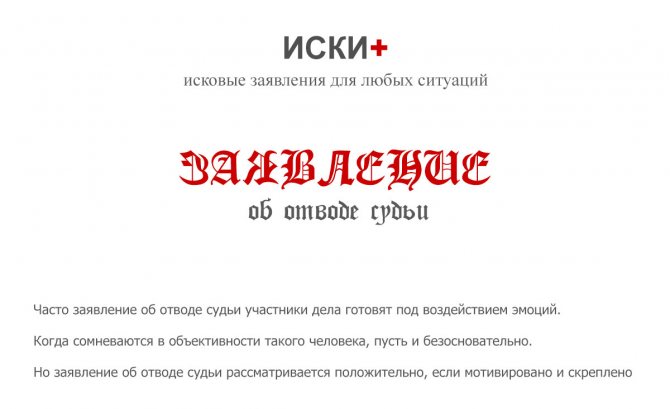
Often, participants in a case prepare an application to challenge a judge under the influence of emotions. When the objectivity of such a person is doubted, although this is often unfounded.
An application to disqualify a judge is considered positively only when it is motivated and supported by evidence. Any participants in the process should approach the application of challenges in a balanced and prepared manner.
The need to prepare an application to challenge a judge is related to his alleged interest in the results of the consideration of the case, personal or indirect. The grounds for challenge are established by Article 16 of the Code of Civil Procedure of the Russian Federation. We suggest using the sample below to draw up the document. The nuances can be discussed with the site’s on-duty lawyer.
Application for recusal of a judge
Circumstances excluding the participation of a judge in criminal proceedings
The judge is a relative of any of the participants in the proceedings in this criminal case;
The judge is a victim or witness in this criminal case;
The judge has already participated in the proceedings in this criminal case (for example, as an expert, inquiry officer or investigator).
How does a judge's recusal work in 2021? The main features of this procedure include the following:
- Any circumstance that excludes the participation of a judge in criminal proceedings must be established reliably (that is, it cannot be based on assumptions, conjectures, rumors and gossip);
- If there are grounds for challenge provided for by the Criminal Procedure Code of the Russian Federation, the judge is obliged to recuse himself and voluntarily refuse to participate in the criminal proceedings;
- If this does not happen, a challenge may be filed by other participants in criminal proceedings: the suspect, the accused, the public prosecutor, the victim, etc.;
- Self-recusal may be declared at any stage of criminal proceedings;
- In turn, an application to disqualify a judge can be filed only before the start of the judicial investigation;
- An exception to this rule is possible only if the grounds for challenge became known to the applicant later - during further legal proceedings;
- A challenge can be either oral or written;
- The ruling on recusal or rejection of recusal is drawn up in the form of a separate document;
- If a challenge filed against a judge is rejected, the hearing of the case continues with the same composition of the court;
- A court decision to refuse to grant a challenge may be appealed in accordance with the general procedure.
Orally - if the applicant participates in the court hearing;
In writing - if the applicant does not participate in the court hearing.
The text of a written application to challenge a judge must include the following information:
- Name of the court;
- Full name and procedural status of the applicant;
- Applicant's contact details;
- Criminal case number;
- Full name of the judge;
- Grounds for disqualifying a judge;
- List of attached documents (if any);
- Date of application.
According to the provisions of Art. 123 of the Code of Criminal Procedure of the Russian Federation, complaints against court rulings in a criminal case are brought in the manner of appeal proceedings - within 10 days from the date of the relevant ruling.
The applicant may apply to the court office in person or by mail. It must be borne in mind that an appeal filed after missing the deadline will be left without consideration.
https://www.youtube.com/watch?v=ytdev
Note! An appeal against a ruling made during a trial does not suspend the trial.
Once the application form is completed, you need to find out where to submit it. As a general rule, if a matter is considered by one official, the application is submitted to the same court where the hearing is taking place. In this case, it is necessary to notify all parties to the case and wait for their opinion on this issue. After receiving the petition, the judge will issue a ruling on self-disqualification or refusal to remove such a person.
Note! If the decision is made by several judges at once, that is, a panel of judges, the application is submitted to this panel: the person for whom the petition was filed will not participate in the consideration.
In addition, sometimes all judges need to be disqualified at once. In this case, the case will be transferred to another judicial body of similar jurisdiction. The principle of territorial jurisdiction of the courts will apply: the case will be transferred to the authority of the nearest district of the city, region, etc.
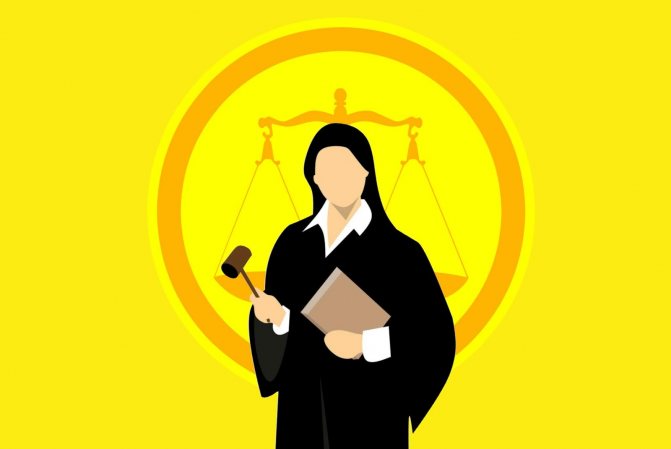
There is a criminal case in my proceedings, during the consideration of which the presiding judge in interim judicial acts has repeatedly expressed his opinion on the circumstances to be proven in the same criminal case.
Naturally, for each such fact, I prepared and made a statement about the recusal of the presiding officer from participation in this process.
The district court is processing criminal case No. (number) on charges of Surname I.O. in committing a crime under Part 4 of Art. 159 of the Criminal Code of the Russian Federation.
I believe that the trial in this criminal case cannot be continued by the district court presided over by federal judge Ivanova I.I. for the following reasons.
In accordance with the meaning of the provisions of Art. 61, part 2, art. 63 of the Code of Criminal Procedure of the Russian Federation, a judge who participated in the court session in which any circumstances were established that were subject to proof when considering a criminal case on the merits cannot further participate in the consideration of this criminal case on the merits in the court of 1st instance.
Thus, on May 11, 2015, refusing to satisfy the request of lawyer V.N. Romanov. on the referral of a criminal case with jurisdiction to another district court, by federal judge of the district court Ivanova I.I. the place of commission of the act charged by the accused was established in advance - the District District of the City and the fact of causing damage to the victim.
Based on the analysis of the charges brought, the said resolution stipulates that: “All actions aimed at stealing funds belonging to PJSC Society were carried out on the territory of the District District of the City. The damage to PJSC "Company" was caused at the place where actions aimed at writing off funds were committed.
It should be taken into account that this judgment is solely the opinion of the presiding judge, who did not share both the opinion of the defense, set out in the above petition, and the opinion of the prosecution.
Thus, objecting to the motion of lawyer V.N. Romanov, state prosecutor P.P. Petrov. it was indicated that the crime charged by the defendant should be considered completed at the time the defendants actually received funds in the City - at the time they were withdrawn from bank cards.
At the same time, neither the state prosecutor nor the victims during the trial ever expressed the opinion that the place of commission of the acts imputed to the defendants should be determined by the time and place of debiting funds from the current account of PJSC "Society", as well as by the place of the actions committed by the defendants, aimed at such, which confirms the defense’s arguments that the court has its own interpretation of the charges, publicly expressed in the resolution of May 11, 2015.
That is, the presiding officer in the present case during the trial gave a subjective assessment, analysis of the charges brought against the defendant and, accordingly, predetermined the question of the circumstances that are subject to proof and establishment only in the deliberation room when rendering a verdict in the case (the commission of socially dangerous actions and the place of commission such, the fact of the occurrence of socially dangerous consequences, causing damage).
This circumstance, the form of presentation and assessment of the circumstances and facts described in the resolution and actually established, excludes the participation of federal judge Ivanova I.I. in this process.
These arguments of the defense are based on the legal position expressed by the Constitutional Court of the Russian Federation in the Determination of November 1, 2007 No. 799-О-О that the expression by a judge in a procedural decision before making a final decision in a criminal case of his opinion on the subject of consideration limits it freedom and independence in further proceedings on the case.
https://www.youtube.com/watch?v=ytabout
Due to the generally accepted principles of fair, independent, objective and impartial justice, the repeated participation of a judge in the consideration of a criminal case (since it was associated with an assessment of the circumstances of the case previously examined with his participation) is unacceptable, regardless of whether it was or was not canceled by a higher court a decision previously made with the participation of this judge.
Otherwise, the position expressed by the judge in the procedural decision on the presence or absence of signs of an event, corpus delicti, on the establishment of certain circumstances to be established and proven in each criminal case, the validity of the conclusion about the guilt of the accused in committing it, the sufficiency of the collected evidence would limit his freedom and independence in further proceedings in the case and, thus, could call into question the objectivity and impartiality of the judge.
The opinions expressed in interim judicial acts about the commission of a crime against the victim, about the place where the act was committed and about the established fact of causing damage to the victim, significantly limit the impartiality of the federal judge Ivanova I.I. when considering the present criminal case on its merits, and therefore it is subject to recusal.



